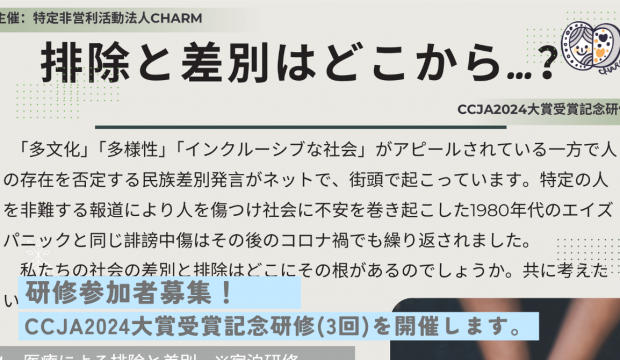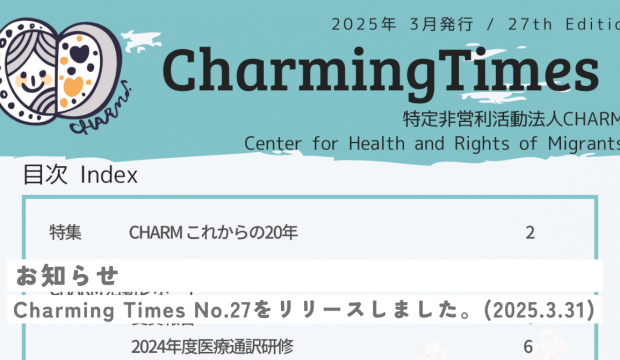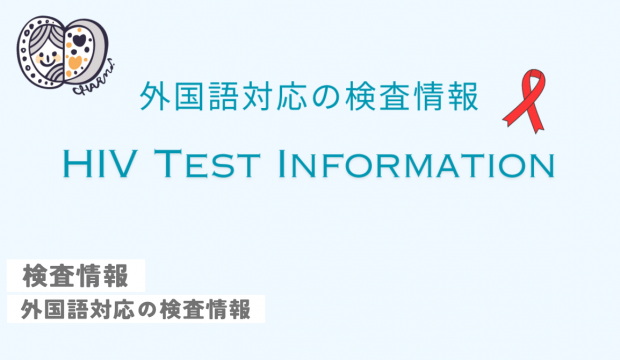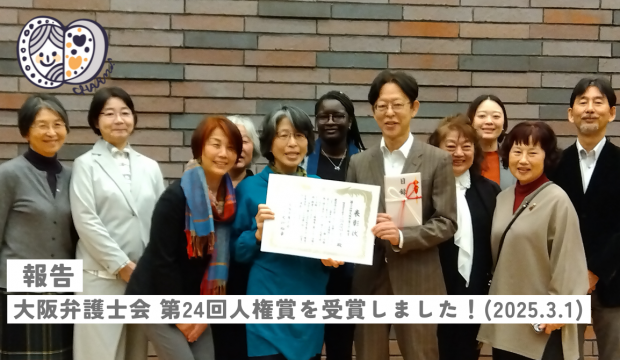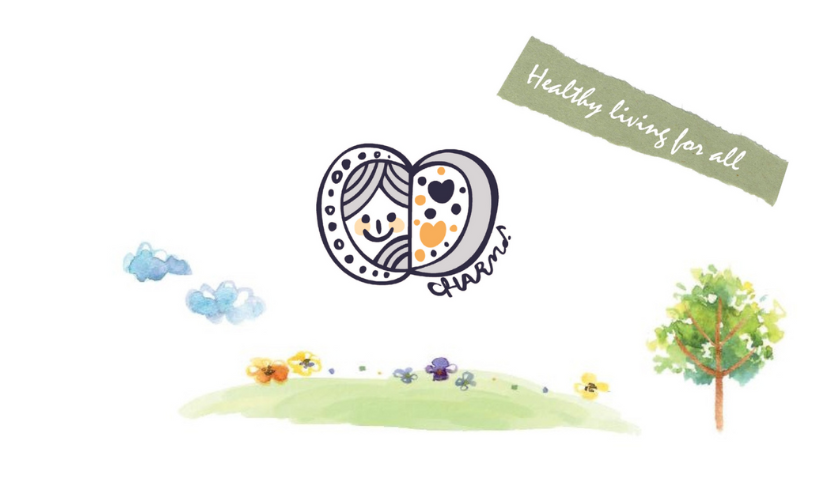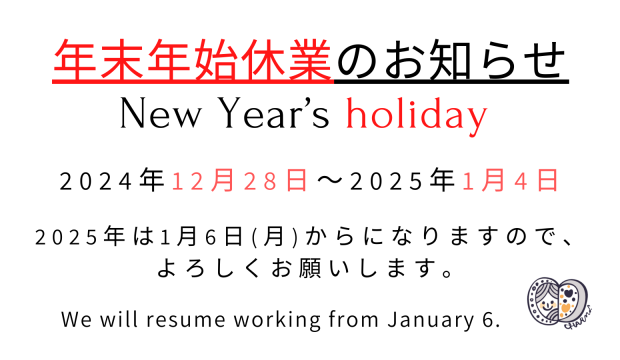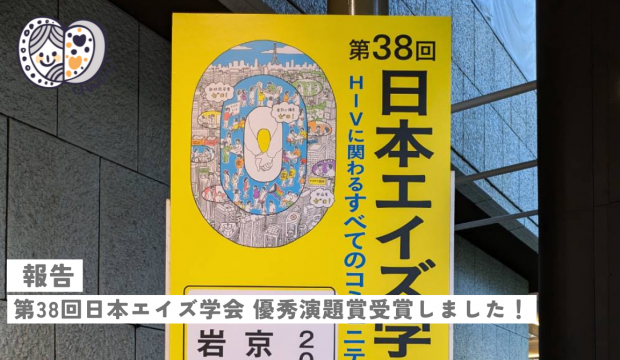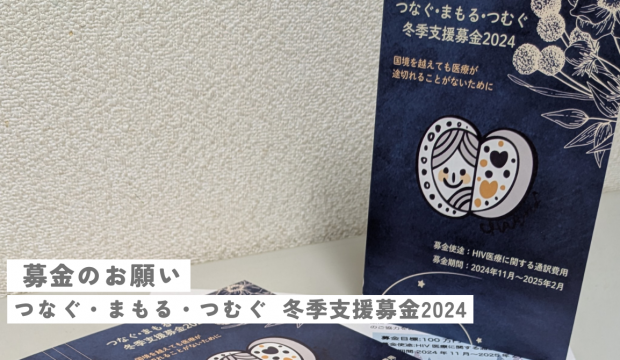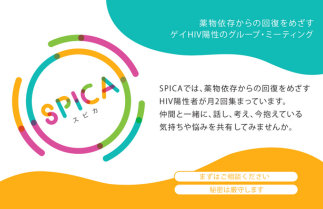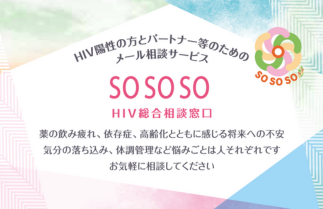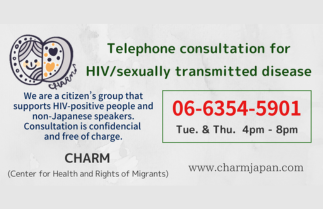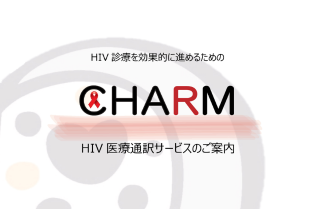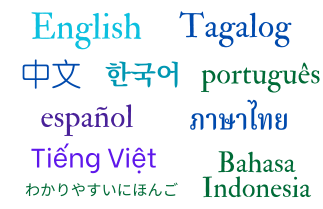Charming Times No.14 Web Limited版
通常では機関誌を発行していますが、14号(No.14)は事務局の都合により、Charming Times Web版のみを公開いたします。
また、【CHARM NOW】と【今これにハマっています】は英訳の用意がないこと、ご了承ください。
目次
- 【CHARMの活動レポート①】日本エイズ学会集会2017に参加して
- 【CHARMの活動レポート②】外国籍女性HIV陽性者の想いを聴く
- 【CHARM NOW】CHARMの今後について
- 【健康に暮らしていくためのヒント】黒酢大豆
- 【今これにハマっています】ズンバと出会って
【CHARMの活動レポート①】日本エイズ学会集会2017に参加して
●医療者とHIV陽性者が一緒に学び議論する日本エイズ学会集会 2017年11月24〜26日
青木理恵子 (CHARM事務局)

日本エイズ学会集会は、医学系の学会ですが、医療従事者が専門用語で発表を行う一般の学会と違いこの学会では、医療者、HIV陽性者、支援者、行政担当者がお互いから学ぶ会となっています。毎年の学会は臨床研究、臨床現場、社会の3つの分野の代表が会長となり、持ち回りで学会をリードしています。
今回は、地域で陽性者を支援する団体ぷれいす東京代表の生島さんが会長となったことで地域の活動やHIV陽性者自身の参加がよりはっきりした学会となりました。一方、地方で活動を続けている当事者グループは活動を行うことの難しさを経験しており、都市部の市民団体が地方の当事者団体と連携して行くことの必要性も感じました。
●第31回日本エイズ学会に参加して
市橋惠子(日本バプテスト看護専門学校)
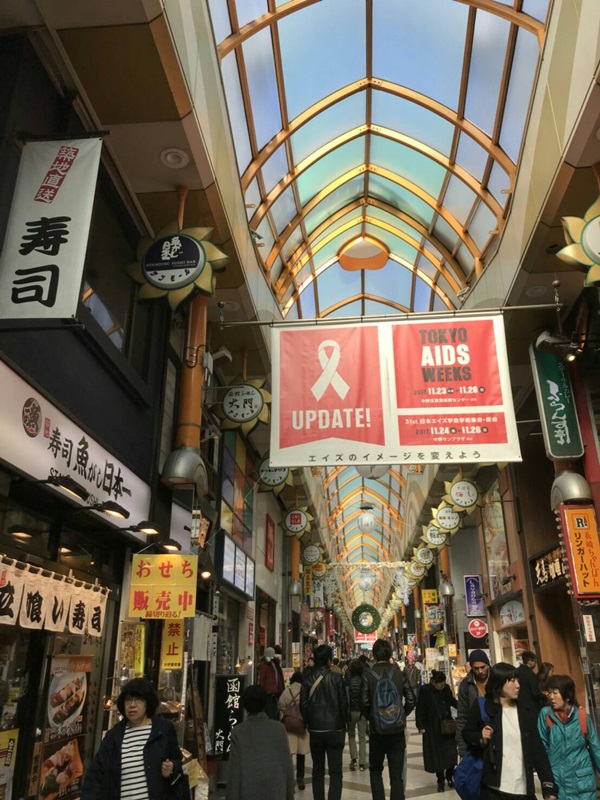
私は、昨年からCHARMの陽性者個別支援プログラムである「お助けシスターズ」や榎本てる子さんが分担研究者を務める「HIV陽性者のコミュニティへの受け入れに関する研究」に研究協力者として関わっています。その関わりから今回のエイズ学会に数年ぶりに参加しました。学会のプログラムは多彩な内容でしたが自分が参加したプログラムの中で特に印象に残ったセッションを紹介します。
まず印象に残ったのは、第1日目のプレナリーセッションでした。「薬物依存症は孤立の病―安心してやめられないといえる社会を目指して」国立精神神経研究センターの松本俊彦氏の講演です。松本先生はアディクション(依存症)の反対語はコネクション(つながり)であると話されました。(詳細は「薬物依存症外来」で検索して見てください。)
次に第3日目に行われた特別プログラム「ポジティブトーク」です。このセッションでは数名の陽性者の方がそれぞれの療養生活や人生について語りました。当事者がその病いとの向き合い方や療養生活の工夫を語ることでピアの方々はもちろんのこと医療従事者にとってもケアのありようを考える良い機会でした。HIV陽性者が当事者として語る場面は学会の色々な場面で見られました。シンポジウム「コミュニケーションの重要性を見直す医療者のホンネ、患者のホンネ」や「スティグマの払拭はだれが払うのか」「第7回世界エイズメモリアルサービス」などです。
当事者が語ることを聞くことから始まるHIV医療の原点は今もそこにありました。それこそがエイズ学会の素晴らしい宝物であると感じました。同時に当事者が語るときにはその当事者に関わる医療者やケア提供者も語ることが重要になってくるだろうと思いました。HIV感染症が長期療養の方向へ確実に向かう今、医療サービスを受ける受益者と提供者の開かれた対話が必要になってくると思います。最後に「ゲイメンズ コーラス」は素晴らしかったです。
(English)
●Healthcare Professionals and HIV-positive People Learned and Discussed Together in the Annual Meeting of the Japanese Society for AIDS Research: November 24 to 26, 2017
Rieko Aoki (CHARM)
The Japanese Society for AIDS Research is an academic society in medical field, but this unique society gives the opportunity for healthcare professionals, HIV-positive people, their supporters, and administrative officers to learn from each other. The chairman of the society meeting is one of the representatives in 3 fields; clinical research, clinical settings, and society, who are taking turns every year.
At this time, Mr. Ikushima of Place Tokyo, an organization that support HIV-positive people in the area, assumed the chairman of the society meeting and that made it clearer to show local activities and participation of HIV-positive people.
Meanwhile, local groups comprised of HIV-positive people have been experiencing difficulties to conduct activities so that we felt necessity of citizens’ groups in large cities cooperate with those local groups.
● Experience of Participating the 31st Annual Meeting of the Japanese Society for AIDS Research
Keiko Ichihashi (Japan Baptist School of Nursing)
I have been involved in Otasuke Sisters, which is a supporting program conducted by CHARM for individual HIV-positive person, and “Research regarding Accepting HIV-positive People in Community” which Ms. Teruko Enomoto is one of the researchers and myself a cooperating researcher. Motivated by my involvement in these projects, I participated the latest Annual Meeting of the Japanese Society for AIDS Research for the first time in several years.
Program of the society meeting covered many different issues. Among the programs I participated, I’d like to introduce the sessions that were especially impressive to me.
First, I was impressed by the plenary session held in the first day. It was a presentation by Dr. Toshihiko Matsumoto of National Center of Neurology and Psychiatry, “Drug Dependence is the Disease of Isolation – In an effort to build a society that patients can easily say they cannot stop taking drugs”. Dr. Matsumoto mentioned opposite meaning of “addiction” is “connection”. (For detail, please search “Outpatient ward for drug addiction”)
Next session I was impressed was the special program held in the third day, “Positive Talk”. In this session, several HIV-positive people talked about their recuperation effort and their life. Listening to their talk about how to deal with the disease and tips in recuperation was a good opportunity not only for peers but for healthcare professionals to think about the way of care.
There were various scenes that HIV-positive people talked about their illness, including the symposiums, “Looking at the Importance of Communication Again – True feeling of doctors and patients” and “Who Bears the Role of Dispelling Stigma?” together with the 7th World AIDS Day Memorial Service.
The origin of HIV medical care, which starts from listening to the patients who are in the middle of it, was existing there. I felt that was the great treasure of this society meeting. At the same time, I thought when HIV-positive people talk about their experiences, it becomes important for healthcare professionals and care givers who are involved in those patients to talk about the issue, too. Because it has become certain that HIV infection is now the disease requires extended care, it will be necessary for recipients and providers of medical service to have dialogues. Finally, I would like to mention Gay Men’s Chorus was fantastic.
【CHARMの活動レポート②】外国籍女性HIV陽性者の想いを聴く
オンバダ香織
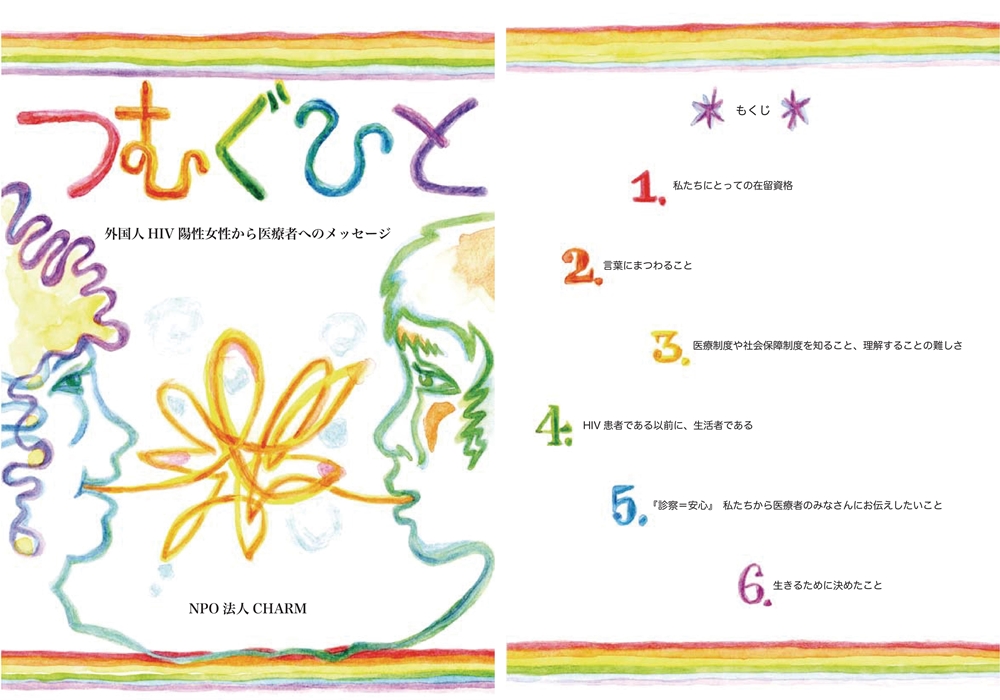
CHARMで実施している女性HIV陽性者対象のプログラム「女性交流会」は今年度11回目となりました。毎年2~3名の新規参加者を迎え、20人前後の女性とその子どもたちが参加していますが、同じ思いを共有する仲間と語り合い、ときには泣いたり笑ったり、リラックス&リフレッシュの一泊二日をともに過ごします。
そしてCHARMではこの女性交流会を通じ、平成27-29年度基盤研究(B)「国際・多文化ソーシャルワークにおけるCBPRの有効性に関する実践的研究」(研究代表者:武田丈)、分担研究「外国人女性HIV陽性者固有のニーズや課題に関する調査」(分担研究者:榎本てる子)のもと、外国籍女性HIV陽性者に焦点をしぼり、日本で療養生活を送りながら暮らす中で、どんな問題や課題がありそれに向き合っているのか、また乗り越えてきたか、何があれば安心できるかなど、個々の暮らしの目線から語り合うグループミーティングを重ねました。ある女性はHIV=死と思っていた理由が「自分の国では貧しければ治療が受けられずに死ぬ」ということだったり、「母国には日本のような医療制度はなく、そもそも制度の意味が理解できない」という人もいれば、「いつか在留資格を失うのではないかという不安がある」というような外国籍の方々特有の意見が出ました。
なかでも私が印象に残ったのは、感染がわかってから、やはり母国に帰りたいと思う人は多いのですが、日本には医療保障制度があり、どの患者も平等に高いレベルの治療を受け続けることができるので、この先も「生きるため」に日本で暮らすと決断をした話です。自分の命をつなぐために言葉を覚え、職を得て、地域に居場所をつくり、日々の生活を送っています。そして「生きる」とはただ命がつながっているのではなく、努力の上に命がつながっていくのだということを、女性たちの姿を通して感じました。
CHARMでは、このような外国籍女性HIV陽性者たちのエピソードを冊子にまとめました。とくに病気が分かり、最初にサポートをしていただく医療従事者の方々に向けて、女性たちはHIV患者である前に日本での生活者であるということ、どのように暮らし、どんな問題や課題があるのかということを知っていただき、医療現場でのよりよいコミュニケーションの構築に繋がればと思い作成しました。ぜひお手にとっていただき、女性たちの声を聴いてください。
(冊子のお問い合わせはCHARM事務局まで)
(English)
Listening to the Thoughts of Female HIV-positive People from Foreign Countries
Kaori Ombadah
A program hosted by CHARM for female HIV-positive patients, “Activities for Women” had its 11th meeting in this fiscal year. We add 2 to 3 newcomers every year and currently, around 20 women and their children participate this meeting to share their thoughts, laugh, cry, relax and have refreshing time together for 2 days.
Through this exchange meeting, CHARM focused on foreign national female HIV-positive people under the research about effectiveness of CBPR in international and multi-cultural social work represented by Jo Takeda, and shared research about specific needs and issues of foreign national female HIV-positive patients led by Teruko Enomoto, and conducted several group meetings to discuss the view of everyday life about what are those women’s problems in their recuperation in Japan, how they faced and overcame those problems, and what are the things they can get comfortable to be with. There were some opinions specific to foreign nationals such as, “I thought HIV-positive equals death because in my country, poor people cannot get treatment and die,” and “My country doesn’t have the medical system like Japan and we don’t understand about the system to start with,” and “I am anxious about losing my residential status some day”.
I was especially impressed about the fact that many women want to go back to their countries after they find out their infection, but they eventually decided to stay in Japan to “survive” because there is the medical security system in Japan and every patient can evenly receive high level treatment. They study the language, get job and find a place in the community to spend daily life. I learned “surviving” does not mean just to continue your life but to continue with effort through these women.
CHARM put episodes of these female HIV-positive patients with foreign nationals in a booklet. We made this booklet for medical workers, the first supporters of these women, to know these women are people who live in Japan before being HIV-positive patients as well as how they live and what problems they have so that they can make better communication at medical setting. We strongly recommend you to take this booklet in your hand. (For inquiry about the booklet, contact CHARM office)
【CHARM NOW】CHARMの今後について
青木理恵子(CHARM事務局)
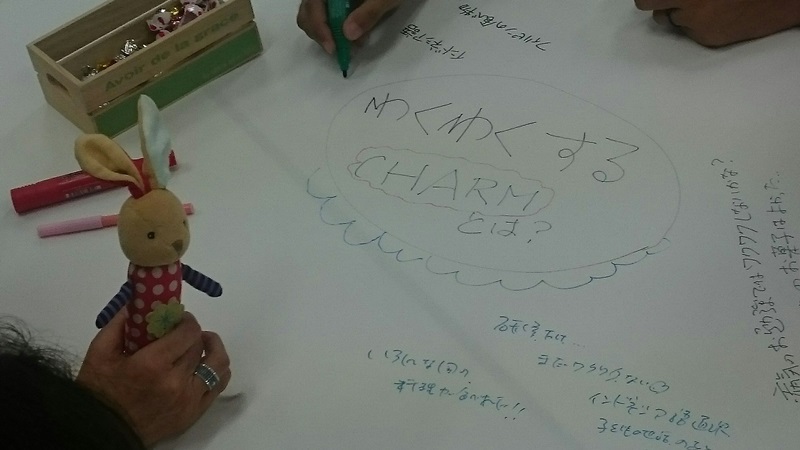
CHARMは今年創立15年を迎えました。この機会にCHARMを取り巻く環境の変化を分析し、現在行なっている活動について大規模な見直しを行いました。10月23日に全体集会として活動をしているメンバー、スタッフ、理事が話し合い、11月12日に拡大理事会を開催して理事とスタッフが協議し、12月16日に理事会としてこれからのCHARMのあり方について決定しました。
CHARMは、これまで通りHIV陽性者が健やかに暮らせる社会を、日本以外の文化や言語を持つ人、マイノリティの人たちが自分らしく暮らせる社会を目指して活動して行きます。特に力を入れることは、行なっている活動の内容を見えやすくすること、関心を持った人が関わることができる入り口をたくさん作ることです。多言語分野では、保健医療通訳を事業化することに向けて行政や医療機関と交渉を進めて行きます。また多言語ホームページを通して日本語以外の人たちが必要とする情報をピンポイントで得られるようなサイトを目指します。HIV陽性者支援については当事者が安心して集うことができる場を仲間と共に作ることを支援します。またHIV陽性者が孤立しないようにつながる仕組みを作り出し、不自由や不安に寄り添う仕組みを作ります。これらのことは会員の主体性と積極性に大いに期待します。みんなでCHARMを発展させていくという方向を確認いたしました。具体的展開については、2018年6月9日(土)に開催されるCHARM会員総会にご参加いただき話し合いに参加してください。
【健康に暮らしていくためのヒント】黒酢大豆
岸本尚子
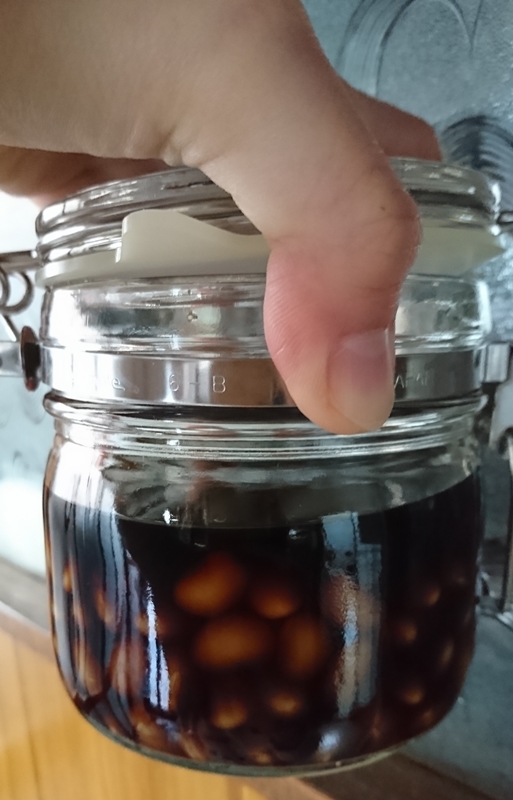
今回は健康にも良いと言われている黒酢と大豆。
黒酢大豆についてご紹介します。
黒酢は玄米または大麦を主原料としており、文字通り黒いお酢です。クエン酸とアミノ酸が多く含まれ、抗酸化作用もありダイエットや美肌効果などが期待される食品です。大豆には植物性蛋白質や美肌効果があるといわれる大豆イソフラボンが多く含まれ、黒酢同様の効果が期待される食品です。
私は毎日健康のためにと黒酢大豆を大きいスプーン一杯(大豆7粒~10粒)摂取しています。特に寒いこの時期、目覚めが悪くなりがちですが朝起きて手洗いうがいの後に摂取すると一気に目覚めます。目も覚めて体にも良い。一石二鳥ですね。簡単にできますので是非お試しを。
黒酢も酸っぱいものとまろやかなものがありますので、お好みにあった黒酢をお使いくださいね。私はまろやかなものをいただいています。
【黒酢大豆の作り方】
1.大豆を洗って軽く水切りをしてフライパンで軽く炒る
2.炒った大豆を少し冷ましてから容器に移し、黒酢を入れる(容器はできれば熱湯消毒)
3.1日半くらい放置(その後できれば冷蔵庫保存)
※大豆は黒酢を吸うと倍になるので、黒酢は大豆より2倍くらいの高さまで入れる。
※昆布を浸ける場合は昆布を軽く洗ってから細かく切り目を入れて黒酢に浸けます。すぐつかりますので初めに2日程度分浸けて、昆布は追加で入れてください。
(English)
Black-Vinegar Soaked Soy Beans
Naoko Kishimoto
Let me introduce Black-vinegar soaked soy beans.
Black vinegar is inky-black vinegar, mainly made from unpolished rice or wheat. Its nutritional content as citric acid, amino acid, and its antioxidant effect, is believed to work for diet, and beatifying skin. Similar effect is expected from soy beans, from its nutritional content as vegetable protein, and soy isoflavone.
For my health, I make it my daily routine to eat a big spoon full of black-vinegar soaked soy beans (7-10 beans). It helps me wake up easily, even in a cold season like this. Black-vinegar soaked soy beans brings good wake up, and also a healthy body. The recipe is easy. Why don’t you also give it a try?
When choosing black-vinegar, please choose the ones you like, since some are sour, and some are mild. I prefer to choose the mild ones.
How to Make Black-Vinegar Soaked Soy Beans
1. Water-wash soy beans, and lightly roast them in a frying pan.
2. Put roasted soy beans into a container after removing its heat, and also pour black vinegar into it. (Recommend to sterilize container before usage.)
3. Leave it soak for approx. one and a half day. (Best to keep it in fridge afterwards.)
*Pour double amount of black vinegar, since soy beans will plump up.
*If you’d like to add kelp, water-wash it lightly and scoring it before soaking it into black vinegar. Wait and see for approx. 2 days, and add additional kelp if necessary.
【今これにハマっています】ズンバと出会って
平松 マリア

みなさん、ズンバを知っていますか?
私は今、コロンビア生まれのズンバダンスにはまっています。まだ馴染みのないズンバですが、日本では3年ほど前から話題にあがるようになったようです。私は最近始めたのですが、ズンバに出会って本当によかったとおもっています。
ズンバを踊ることで体が楽になって、体重も知らない間に落ちました。踊るだけでダイエット効果があるって本当にうれしいです。いい音楽で素晴らしい人たちと一緒に踊ることが楽しいです。ズンバダンスは踊りとエアロビクスが組み合わさっていてやりやすく、体が柔らかくなり、肩こりも治ります。またヒップホップとラテン系の踊りも体験でき、とても楽しいです。たくさんの音楽と踊りに触れ、知らない間に異文化体験もできる活動であると感じています。年齢も関係なく楽しくできて、冬でもたくさん汗をかくため、肌もツヤツヤになります。
現在とよなか国際交流協会の中にあるフィリピノヤングatハーツクラブという活動の中でズンバ教室を行っていて私はここに通っています。本格的なズンバ教室はとても少なく、これは他の外国籍住民も同じ意見のようです。ここのズンバ教室はフィリピン人だけでなく、他の国の外国人や日本人も参加しています。色んな国の人達と踊りながら交流できることがとても幸せです。
CHARM内でもズンバを取り入れて、皆で踊って健康促進したいですね。
翻訳協力:Yamaguchi, Nishitani


